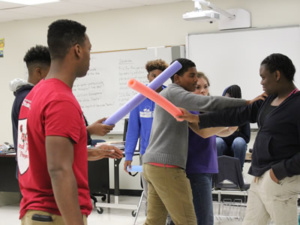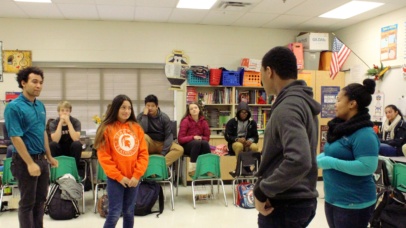What is The Romeo and Juliet Project?

This nationally-acclaimed residency uses Romeo and Juliet, its characters, and its many pivotal decision moments as tools for Freshman students to imagine and rehearse life-saving choices in the face of armed violence, peer pressure, prejudice, and inadequate guidance. Working in concert with educators, TSC Teaching-Artists (TA’s) interweave these strategically-placed sessions, creating a positive and enthusiastic first impression of Shakespeare through students playing the play. During The Romeo and Juliet Project every freshman class receives three visits from TSC TA’s. Over the course of three sessions, students develop language to articulate their feelings, gain greater empathy and compassion for one another, and explore potentially life-saving actions in the face of potentially violent conflicts.
The Project also includes a live performance of the play. Students experience hearing, seeing, and feeling the play Romeo and Juliet in its original art form as a piece of live theatre. The production, freshly re-imagined each season, promotes a student’s discovery of the play as relevant and accessible and builds upon their experiences during the residency portion of the Project. The Teaching-Artist’s who lead students through the three-part residency perform the play.
A play about hope and joy in the midst of systemic rage, Shakespeare’s tragedy teaches a culture how to be accountable and take the necessary steps for real change. Simply produced and performed by nine actors, TSC’s urgently-paced production brims with youthful good humor and is immediately accessible. This entree to live Shakespeare sets the stage for a lifetime of theatre attendance.
Student Resources
In 2023, counselors from Planted Therapy Group (PTG), who specialize in therapeutic practices for adolescents, facilitated a staff training session for our Romeo and Juliet Project Teaching-Artists. The experiences and expertise shared by these mental health professionals left our Teaching-Artists with valuable insights and skill sets that are shared with students and teachers who participate in the Romeo and Juliet Project. We hope these resources can aid those in need.
Suicide and Crisis Lifeline
9-8-8 (can text or call)
General Information about the Lifeline
Warmline Numbers
A warmline is a phone number you call to have a conversation with someone who can provide support during hard times. Whether you’re in crisis or just need someone to talk to, a warmline can help.
MHA of East TN
(865) 584-9125
Monday – Friday, 8:30 am – 5:00 pm
Mental Health America Warm Line (NATIONAL)
(817) 546-7826
Monday – Friday, 1:00 pm – 5:00 pm
PA Contact Helpline (NATIONAL)
(800) 932-4616
Available 24/7
Risk factors are characteristics that make it more likely that someone will consider, attempt, or die by suicide. They can’t cause or predict a suicide attempt, but they’re important to be aware of.
-
Mental disorders, particularly mood disorders, schizophrenia, anxiety disorders, and certain personality disorders
-
Alcohol and other substance use disorders
-
Hopelessness
-
Impulsive and/or aggressive tendencies
-
History of trauma or abuse
-
Major physical illnesses
-
Previous suicide attempt(s)
-
Family history of suicide
-
Job or financial loss
-
Loss of relationship(s)
-
Easy access to lethal means
-
Local clusters of suicide
-
Lack of social support and sense of isolation
-
Stigma associated with asking for help
-
Lack of healthcare, especially mental health and substance abuse treatment
-
Cultural and religious beliefs, such as the belief that suicide is a noble resolution of a
personal dilemma
-
Exposure to others who have died by suicide (in real life or via the media and Internet)
Some warning signs may help you determine if a loved one is at risk for suicide, especially if the behavior is new, has increased, or seems related to a painful event, loss, or change. If you or someone you know exhibits any of these, seek help by calling the Lifeline.
-
Talking about wanting to die or to kill themselves
-
Looking for a way to kill themselves, like searching online or buying a gun
-
Talking about feeling hopeless or having no reason to live
-
Talking about feeling trapped or in unbearable pain
-
Talking about being a burden to others
-
Increasing the use of alcohol or drugs
-
Acting anxious or agitated; behaving recklessly
-
Sleeping too little or too much
-
Withdrawing or isolating themselves
-
Showing rage or talking about seeking revenge
-
Extreme mood swings
Coping skills do not solve your problems but they can help you get through a situation until you are able to process and explore with a safe adult. Coping skills take practice and often repetitive action to be effective. This is not an exhaustive list and you may find that some coping skills work better for you than others.
Grounding Techniques help shift your focus from a stressor to something more tangible/concrete.
TIPP is a distress tolerance skill that can alleviate high intensity emotions fairly quickly. TIPP is an acronym that stands for the following four steps: temperature, intense exercise, paced breathing, and progressive muscle relaxation.
Mindfulness is the act of being present in the moment and noticing what is going on within and around us. This practice focuses on non-judgment and slowing our reactions to daily occurrences.

How Can I Get Involved?
You can help ensure our success in the classroom by becoming a Project Sponsor. Your sponsorship helps fund this exciting outreach endeavor, further guaranteeing that no student or school will EVER have to pay to participate. For additional sponsorship information, please contact sarahhankins@tnshakespeare.org.
For more information, please contact the TSC Education Department at sarahhankins@tnshakespeare.org or (901) 759-0620.
What students and teachers are saying about TSC’s Romeo and Juliet Project:
“I did learn more about the characters, and it was easier to understand the story when you’re seeing it in action or even playing in it for yourself. Makes it a whole lot more fun and experience-able.” – Houston High School Student
“The Project is a boon to our study of the play. It increases students’ engagement with and enjoyment of the play. At the end of the year, students often cite Romeo and Juliet as their favorite unit of the year, with Tennessee Shakespeare’s Romeo and Juliet Project being a key factor. Outside of COVID interruptions, we’ve participated in the Project every year I’ve been at Houston, and I want all our 9th graders to have the opportunity to participate in the experience.” – Houston HS Educator
“The students love this! They actually look forward to exploring the play and acting out the scenes with the actors and their peers. A play is meant to be seen and heard, not just read. This is the best way!”
– Mary Frost, Bartlett Ninth Grade Academy
88% of students said they were more interested in the study of Romeo and Juliet due to TSC’s classroom-led sessions.
90% of students were able to see Shakespeare as more relevant than before due to the Romeo and Juliet Project.
The Project creates over 24,000 points of contact with Memphis high school Freshmen every year.
Click here to view the 2023 Romeo and Juliet Project Final Report.
Click here to view the 2021 Romeo and Juliet Project Final Report.
Click here to view the 2020 Romeo and Juliet Project Final Report.
Click here to view the 2019 Romeo and Juliet Project Final Report.
Click here to view the 2018 Romeo and Juliet Project Final Report.

Funding for the Project is generously provided by:
International Paper, Jack Jones Children’s Literacy Fund, ARTSmemphis, Tennessee Arts Commission, Barbara B. Apperson Angel Fund. 


